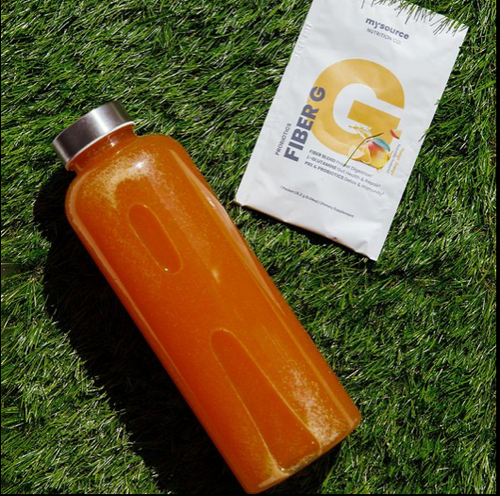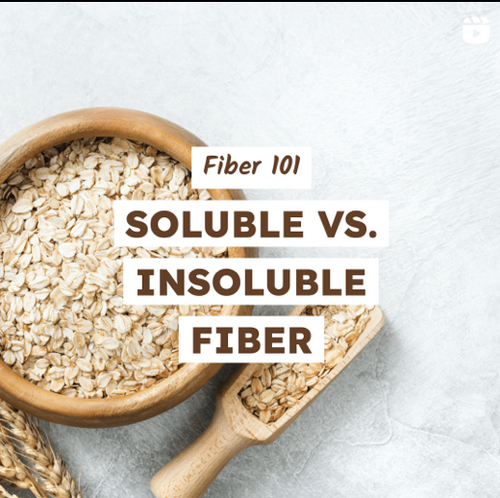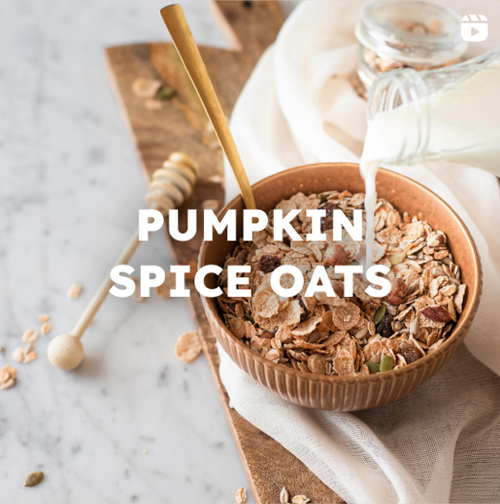What is gut health and why is it so important?
Gut health is the term used to describe the function and overall health of the gastrointestinal tract and the complex balance and interplay of the thriving community of microorganisms that it contains.
Our gut houses trillions of live microbes such as bacteria known as the ‘gut microbiota’. It’s unique to each individual and is linked to a range of essential bodily functions.
How exactly does our gut bacteria affect our health? Here is a summary:
- Gut bacteria help our bodies digest food and absorb nutrients - they’re good at breaking down certain types of fibre to salvage beneficial nutrients.
- They support immune health and functioning. In fact, 70% of immune cells are found in the gut.
- They help protect us from harmful bacteria that can otherwise overgrow in the gut.
- They synthesize essential vitamins including K and B12.
- When breaking down dietary fiber, they make beneficial by-products called short chain fatty acids (e.g. butyrate, acetate and propionate). These have further roles such as providing fuel, releasing gut hormones, supporting blood sugar balance and helping to reduce inflammation.
Further read: 4 Things That Can Harm Your Gut Bacteria.
How many poops a day is too many?
This is a very common question! So there actually isn't a specific clinical definition of frequent bowel movements. For a healthy individual a normal number of bowel movements can be anywhere from once every three days to three times daily. Anywhere within this range is considered normal.
That being said, the main thing to be aware of is when your personal pattern changes. For example if you are normally someone who 'goes' once a day, but over the course of a few weeks see your pattern become more or less frequent, this might be something to further pay attention to.
However, unless you find yourself experiencing very loose stools, pain, or even blood in your stool, it's unlikely the change in pattern is due to an illness. Your lifestyle and diet are most likely to blame.

What are some symptoms of poor gut health?
Since your gut is connected to so many different systems in your body, symptoms can vary greatly from person to person. While some people may experience digestive issues as a result of poor gut health, others may experience changes in energy, skin health, hormonal imbalances, mood irregularities or weight fluctuations.
- Bloating, Constipation, Diarrhea, Acid Reflux, Abdominal Pain
- Skin issues (eczema, acne, rosacea)
- Weight gain, sugar cravings, food sensitivities
- Sleep problems, changes in mood and energy levels
- Bad breath
What causes bloating? Is it something I'm eating?
Bloating is a feeling of abdominal distension or pressure that may be accompanied by visible swelling of the abdomen. More women than men report feeling bloated towards the end of the day.
Bloating may be caused by eating sugary or starchy foods that are not completely absorbed in the small intestine, but are fermented by the bacteria in the colon which generate excessive amounts of gas. Such foods include fresh or dried fruits, especially plums, prunes, apricots, peaches apples, pears, incompletely ripened bananas, pulses,(beans, peas, lentils), root vegetables such as onions, beetroot, carrot, parsnip, reheated potato, cereals like oats and wheat, chewing gum and large quantities of milk and cream. So reduce your consumption of gassy foods. But you don’t have to eliminate them completely.
As your bloating starts to improve, you can re-introduce more of these foods into your diet. Some probiotics are said to contain strains of bacteria that only generate small volumes of gas and hence reduce symptoms of gas and bloating. Some prebiotics may also reduce bloating because they promote the generation of bacterial species that generate less gas.
Overall, pay close attention to what foods make you feel bloated and try to limit them from your diet as much as possible.

What's the difference between prebiotics and probiotics?
Prebiotics are non-digestible fibers that bypass the small intestine, down to the colon where they are fermented by Probiotics or the “good” bacteria that colonizes the gut”, says Dr. Vincent Pedre, author of the Happy Gut. In other words, Prebiotics are the main fuel source that Probiotics utilize to maintain a well functioning gut. Prebiotics can either be consumed from certain foods or through supplemental use.
Probiotics are live bacteria and yeast present in the gut microbiome that help the intestines break down food. Probiotics are labeled as the “good” or “healthy” bacteria because they help to fight off pathogens and keep the gut function optimally. Moreover, there are a variety of probiotics strains including lactic acid producing bacteria, non-lactic acid producing bacteria, and different types of yeast. Each of these probiotic strains can have different functions and effects on the body.
You need both pre and probiotics. It’s a synergistic relationship. Without prebiotics as fuel, probiotics would starve — leaving you open to a host of problems, such as leaky gut, a compromised immune system, and constipation. And with no probiotics around to eat them, prebiotics would be of little value to your gut.
Further read: Prebiotics vs. Probiotics.
Should I be taking a probiotic supplement?
My philosophy is that food always comes first – we should have a solid foundation of a variety of healthy foods before adding in supplements. But I do believe most people would benefit from probiotics – I take them myself.
Most people simply do not eat enough foods that contain probiotics or eat enough fiber to support the probiotics in the gut. So the nutrition should be addressed first, and probiotics can help along the way. Probiotics can also be helpful for those who have taken antibiotics in the past, have IBS, SIBO, or deal with other digestive issues.

Why is fiber important and what fiber sources are best for a good digestion?
Fiber is a type of carbohydrate and the portion of plant-derived foods (fruits, vegetables, nuts, seeds, legumes and grains) that the body can’t digest. High-Fiber foods provide various benefits including:
- Helping you to prevent and relieve constipation
- Promoting the feeling of fullness in between meals
- Helping you to lower LDL Cholesterol
- Helping you to balance blood sugar levels
The recommended daily fiber intake for Women is 21-25 grams, while Men should aim for 30-38 grams a day. Yet, more than 90 percent of women and 97 percent of men do not consume these amounts.
How can I improve my gut health longterm?
There are so many things we can do to support our gut health. First and foremost eating a variety of fruits, vegetables, whole grains, beans, and other plant-based foods lays the foundation for a healthy gut. Also incorporating foods containing probiotics, such as yogurt, kefir, fermented cottage cheese, sauerkraut, kimchee, and fermented vegetables. Avoiding too much sugar and processed foods will also keep our guts happy.
Some other lifestyle behaviors can positively influence the microbiome as well. These include getting 7-8 hours of sleep nightly, managing stress levels, eating slowly and mindfully for optimal nutrient absorption, and drinking enough water.

What foods are good for gut health?
Foods that are healing for the gut include pre and probiotic rich foods, foods that are anti-inflammatory, including green leafy vegetables, berries, nuts and seeds, as well as, whole grains. Also, foods that contain high amounts of omega 3's such as salmon, chia seeds or flax seeds are great for your gut and digestion.
Foods to avoid include, sugary foods and drinks, processed and fried foods and excess consumption of diary products. These foods tend to be inflammatory and do not contain the nutrients and fiber your gut needs to happily thrive.
In a nutshell, your gut loves unprocessed, whole foods that are freshly prepared and home cooked.
Futter read: Top 26 High Fiber Foods You Should Eat Everyday.
Are there any fun food myths when it comes to gut health?
For some reason, bone broth has gotten this health halo when it comes to “healing the gut.” Maybe it’s because of the collagen in it, but there is no actual scientific evidence that this is the case! If you like it, go for it, but I would definitely recommend eating more fiber before sippin’ on bone broth if you have gut issues!

We hope you enjoyed today's FAQ. If you have more questions for future Q&A's don't hesitate to email us your questions. Click here to submit your question.
Welcome to MySource Nutrition
We are happy to welcome you to our community. Say goodbye to occasional constipation, bloating, sugar cravings and other gut related issues with MySource's Fiber G.







